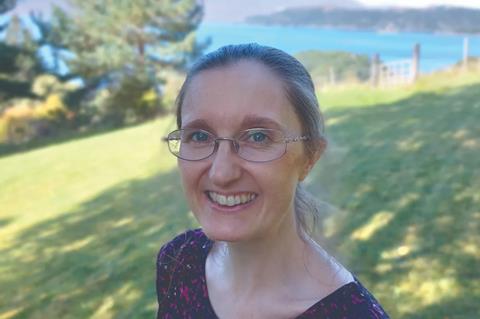Does the biblical instruction to honour your parents mean you have to spend the festive period with your emotionally abusive alcoholic father? That’s a question Alexandra Walker grappled with for many years

From the outside, Alexandra Walker’s life looked pretty perfect. The only child of the late Conservative MP James Cran, she was a talented student who excelled academically and musically.
Alexandra describes her upbringing as “fairly light touch Christian”. Her personal faith blossomed thanks in part to attending an Alpha course while studying at the University of St Andrews. That was also where she met her husband, Simon.
After her PhD, Alexandra and Simon moved to London, and Alexandra began her career in the civil service. “I was doing well at my job, and everyone thought everything was fine,” she says, but inwardly, “I began to think I was falling apart.”
By this time, she had developed severe anxiety, insomnia and two forms of obsessive compulsive disorder (OCD). The couple had started to attend a new church, where they discovered that their new minister was also a Christian counsellor.
“She knew straight away that my father was the problem,” says Alexandra, “but if she tried to ask me about him, I would put all the barriers up. [I’d say]: ‘Why are you asking me about that? It’s all fine. I love my father.’” Looking back, she says that she was in denial about the root cause of her emotional and mental health problems: her father’s long history of abusive behaviour towards her.
The reality
Alexandra says her earliest memory is feeling “wary” of her father’s “Jekyll and Hyde character”. He could be loving and kind at times, she says, but was also volatile, flying into a rage at the slightest provocation. On one occasion, aged ten, she challenged him during a game of Monopoly. “I’m mathematical, and I knew that he had too much money for all the properties he bought,” she recalls. With a child’s sense of injustice, she called him out for cheating, and he “blew up”.
Eventually, Alexandra realised the only way to “fix the problem” was to recant what she had said. “It actually makes me feel emotional right now, to say that. I just had to say: ‘I’m sorry, Daddy, I was mistaken. You didn’t take any money from the bank.’ I knew it wasn’t true, but it was the only way to stop him being angry.”
Over time, she became hyper vigilant, modifying her behaviour to keep the peace. That led to more complex mental health issues, including OCD and anxiety.
The not so jolly season
Christmas was always “an incredibly tense time”, Alexandra recalls. The first Christmas that she and Simon were married, they stayed with her parents. “There was a massive row,” says Alexandra. “Simon didn’t really know about my family dynamics…he was like a rabbit caught in the headlights.”
Another year, her father picked a fight on Christmas Eve. “It went on and on and on. I sank to my knees and just screamed: ‘I’m not doing this anymore.’ I walked out of the door at 11:30pm into the Scottish countryside.” It was “the worst Christmas ever”, she says.
Eighteen months later, in 2014, her mother died of ovarian cancer. The day before the funeral, things came to a head. The previous year, Alexandra and her husband had spent Christmas Day with Simon’s father, who had late-stage Parkinson’s disease, and visited her parents a few days later. “My father said: ‘Your mother woke up on Christmas Day, and she was so miserable, she could not believe that you had chosen not to be with her!’ Even now as I say that, I’m crying, because what a horrible thing to say. It was awful.”
Estranged
As her father’s drinking increased and his behaviour worsened, Alexandra tried to find ways to protect her own mental health while staying in her father’s life. But in 2022, an incident occurred that “crossed a line”. Having previously spoken to alcoholism experts, she knew it was serious enough that she had to confront it. Her father “reacted angrily”, denying what had happened and telling his daughter that she “shouldn’t have mentioned it”, and her job was to “honour” her parents.
Feeling she had no choice, she emailed to tell him their relationship was over.
I didn’t want to lose Christmas, because it’s a beautiful thing
The estrangement caused complex and mixed emotions. She was sad, but also felt “liberated” to deal with her own emotional healing at last. While some friends were supportive, others found it harder to understand.
“I totally get the commandment to honour your parents, but I don’t think that’s a free pass for parents to act however they want and get away with it,” Alexandra explains. “Parents can have huge detrimental impacts on their children, and if we don’t talk about that, how is it ever going to get better?”
A year after the estrangement, Alexandra received a message from her father’s neighbour. They were concerned at the post piling up and the uncut grass in the garden. “I said: ‘I’m afraid you have to go to the police. If he’s alive, and I bring the police in, he’ll be so angry at me, and I’m not willing to risk that.’” When the police found her father, there were lots of alcohol bottles in the house. “We don’t know the exact cause of death, but it’s pretty certain that alcohol played a role.”
Reclaiming Christmas
Having experienced so many years of difficult festive seasons, Alexandra and her husband made a bold decision in 2021, just prior to the estrangement. They cancelled Christmas. No cards, no presents, no decorations, no family. But the reset allowed her to see what she was missing. “I said: ‘Simon, I don’t want to lose Christmas, because it’s a beautiful thing. I want to reclaim it for myself.”
The following year, she undertook “an active experiment”, choosing ways to mark the season that allowed her to enjoy it afresh. It wasn’t a perfect Christmas, she says, but “when difficult things came along, I knew how to handle them and then be able to move on and enjoy the things that I wanted to enjoy”.
Reclaiming Christmas was “a huge part of my healing”, says Alexandra. “Finding the beauty again for myself and letting some of the difficult stuff drift into the past. I can let that go now.”
Alexandra’s book Reclaiming Christmas is available now at damselnotindistress.co.uk






































No comments yet